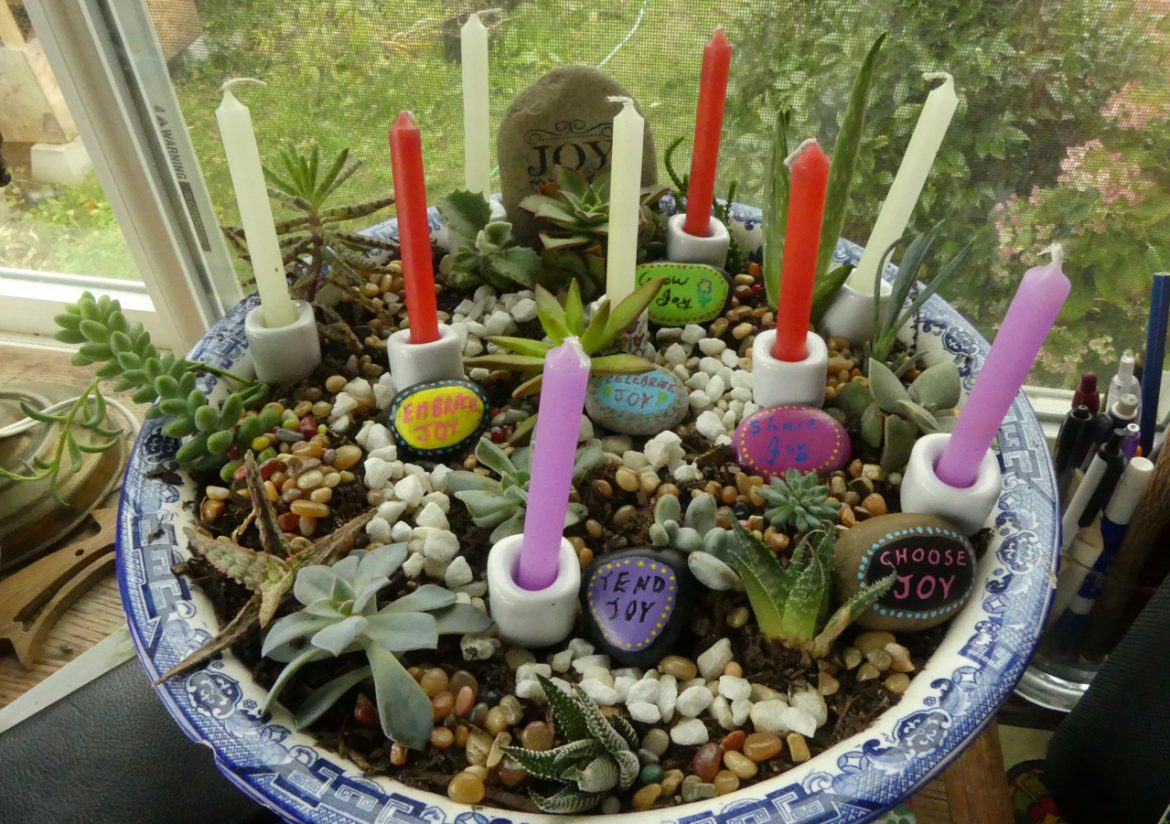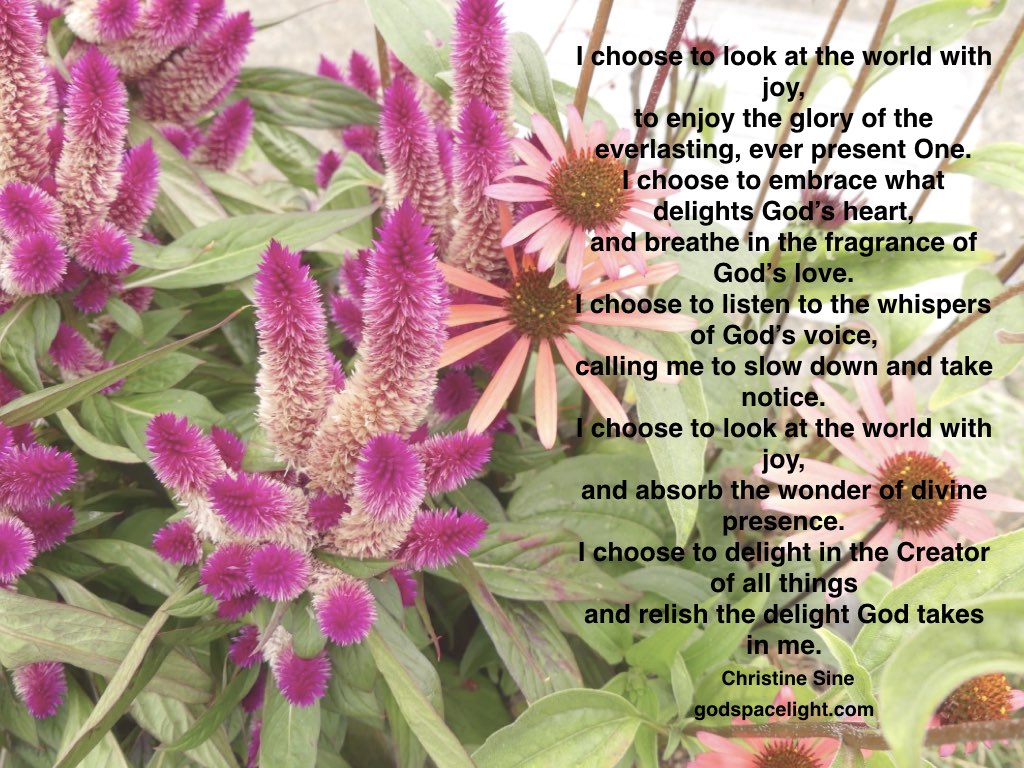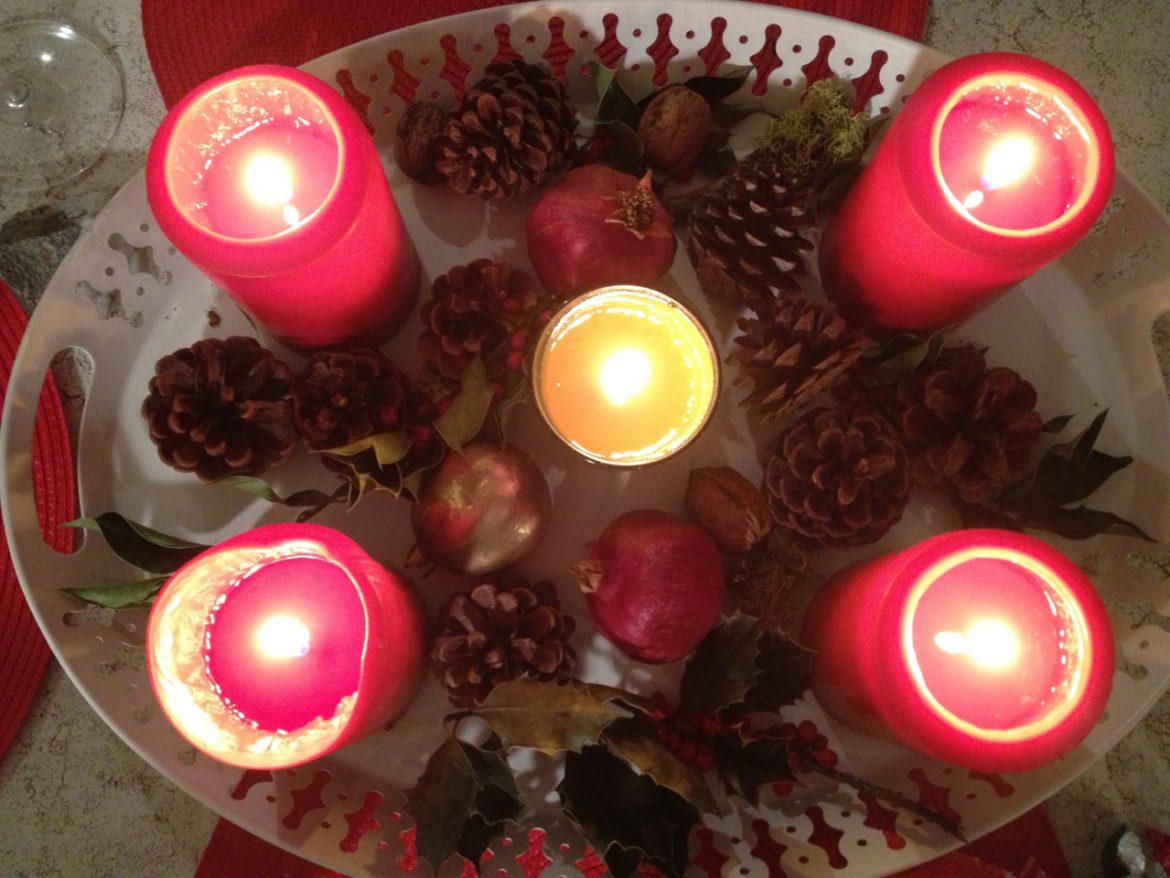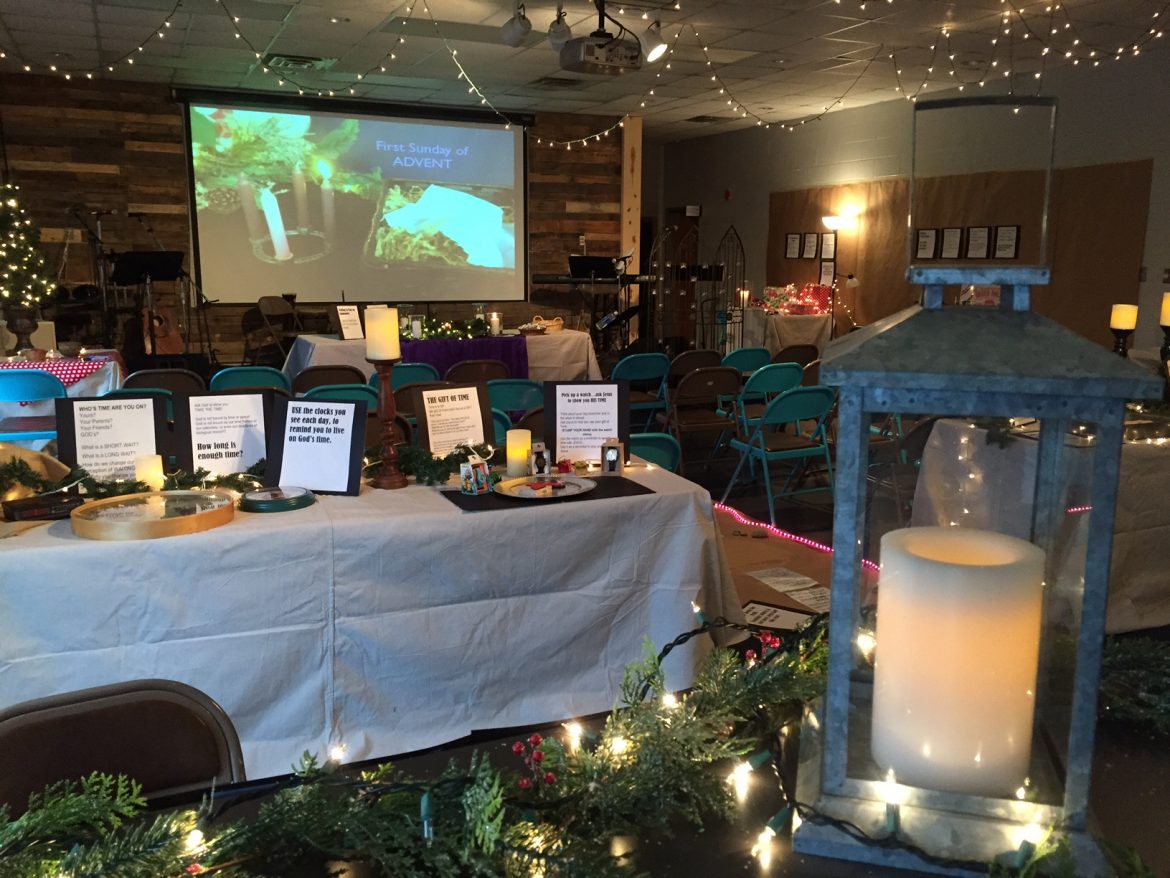by Christine Sine
Welcome to Celtic Advent. I cannot remember when I have had more fun getting ready for Christmas. Starting some new practices has stirred my creative juices in new ways providing a wonderful sense of closeness to God and expectation for the coming season. The photo above is of my completed Advent garden – at least as complete as something that will continue to grow can be. It is set up on our dining room table and will provide a focus for both Tom and I as we celebrate the season each day. As I mentioned in my Monday post, I purposely chose to recycle on of my existing gardens, choosing a circular bowl to remind me of the circle of my life (a symbol so important to the Celts… but more of that next week). I also found that pulling out the old plants, dividing some of them, and replanting all of them in fresh soil was a great reminded that everything in my life is recycled too. I am constantly needing to replant and rearrange what is in the circle of my life to give me greater joy.
The photo below is of the altar I have set up for my personal morning devotions. An ancient icon of the annunciation that belonged to a relative who was a Greek orthodox priest, a “stained glass” image of Jesus and Mary, given to me by a friend who died shortly after of cancer, some of my favourite heart shaped rocks, my air plants and other living plants all on an “altar cloth” of a tea towel with designs from the Book of Kells. I love combining items that have sentimental value with some I have made, others that are repurposed and still others that are living. It is a great reminder to me that as we move towards the birth of Christ we move towards the One who renews and transforms all things, the One for whom nothing is ever lost or abandoned. 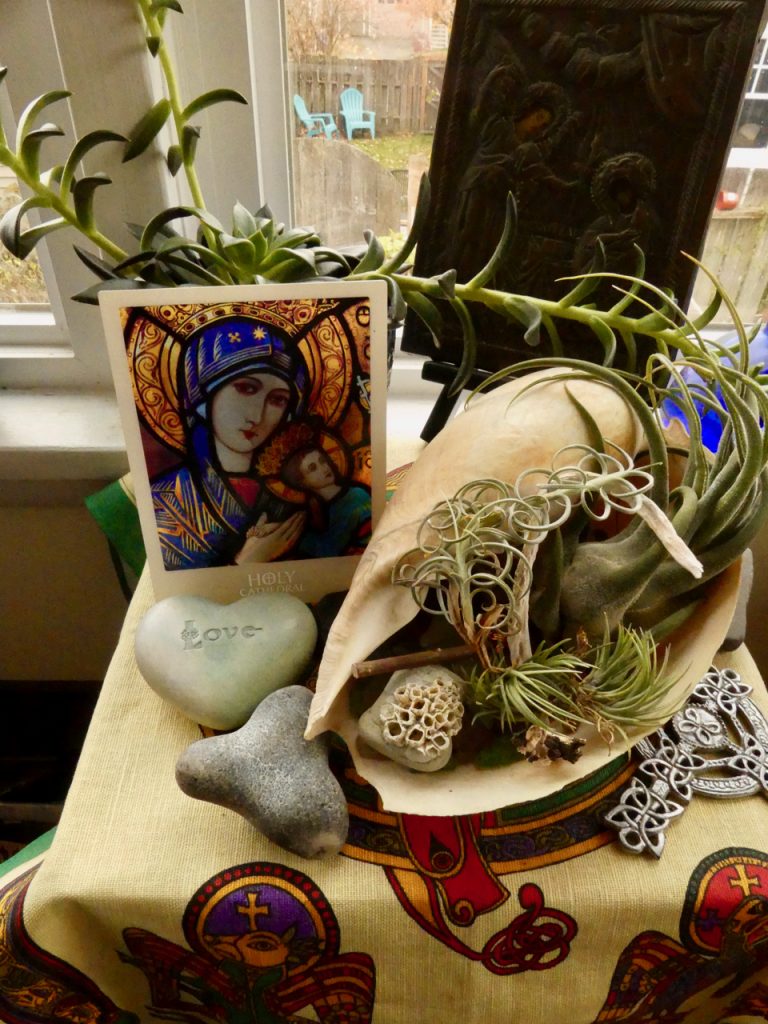
Tom and I are still discussing exactly how we will celebrate each day, after all this is a new practice for us, but at this point we intend to light the appropriate candles in the Advent garden, read a short Celtic meditation each morning and then a prayer. We are also both setting reminders to pause at certain times during the day for a short “rest in the moment” break, a time to refocus and remind ourselves of what really matters in our lives.
Forgive any reluctance
we might have to engage
fully with this new day.
Replace our detachment
with expectation,
for all we might achieve
if we put our trust in you
and your confidence in us.
WAKE UP TO THE TECH REVOLUTION!
The tech revolution didn’t begin with the I-phone in 2008. It began 500 years ago with the creation of the printing press. That innovative technology transported people all over the planet into this new modern world.
WAKE UP TO A 33 YEAR OLD RADICAL UNLEASHING THIS NEW TECH!
This year we are celebrating the radical action of a 33 year old named Martin Luther. Martin not only broke away from the Catholic Church he used this remarkable new technology to make the bible available to all people not just the clergy.
As a consequence young Martin Luther became one of the leaders of the Protestant Reformation. This movement spread the gospel all over the world teaching believers how to study the Bible for themselves to follow in the way of Jesus.
In order to faithfully pass on their faith to the next generation many of these new protestant denominations created sets of doctrinal propositions. Too often these doctrinal statements were placed on the same level of authority as the scripture itself.
Today church planters report that young people, who were raised in churches that insisted that they “pledge allegiance” to a set of doctrinal statements, are looking for something more. They are looking for a more personally engaging approach to scripture to learn more about how to authentically follow the life and teaching of Jesus in their entire lives.
WAKE UP TO ACCERATING GROWTH OF NEW TECH IN CENTURY 21
All our lives have been forever changed by the creation of new technology from the internet, the IPhone and coming soon Virtual Reality. Young Christian innovators today, like Martin Luther, are seeking to use this new tech to share the story of Jesus. Even the American Bible Society is using the internet to share biblical resources more broadly so people can read and study the Bible for themselves.
However, in spite of this growing access to scripture globally we are seeing Christians in America “spending less time with the Bible and ascribing less authority to it than they used to.” According to Barna Research. They added “Led by millennials, 19% of Americans see the Bible as ‘just another book.’”
Roxeanne Stone, Barna’s Editor in Chief states, “It can be hard to have a sense of the Bible being an authority when you have a universe of knowledge at your finger tips.” With accelerating influence of the new tech we do indeed have access to not only to a new “universe of knowledge” but also a broad range of competing world views.
This new reality will increasingly challenge not only the leadership of new church planters, but also Christian educators and increasingly Christian families who want to raise their young in the way of Jesus.
WAKE UP TO THE 24 HOUR CONNECT TO TINY SCREENS
I can remember in the 70s and 80s when parents attempted to control their children viewing one screen in the living room with varying degrees of success. In the 90s we started to see multiple screens in families for the first time…including teens with their own TVs in their rooms. Parents began to lose screen control.
In 1995 I remember parents in the Temescal Community in Berkley California who found a successful way to regain control of media in their family. Bill and Cherrie had two pre-teens. They decided to have only one screen in their home which they used primarily as a video play back unit. They took their two kids to the library once a week to select the videos they wanted to watch in the coming week. Other families in their community supported this initiative supported this form screen stewardship.
However, today young parents tell me the only sense of influence they seem to have is how early to let them have their own screens. Many parents tell me that once their young master their tiny screens they feel an increasing sense of a loss of control.
I honestly wonder, with a growing number of church leaders, how much influence can 45 minutes of bible stories on Sunday have when Pew Research tell us kids are on their screens 8 to 9 hours a day. Do any readers know of parents that are finding ways to not only control screen time but to also take family time to share about the way of Jesus every week?
I am told by leaders in InterVarsity Christian Fellowship have college students put their I-phones away in their back packs at the beginning of their prayer meetings.
I heard of one church plant group which has a bucket in which everyone deposits their I-phones before they study scripture together…focusing singularly on their Bibles and their conversation. How does your community steward the use of the tiny screens you carry with you?
PLEASE RESPOND TO 2 QUESTIONS SO WE CAN SHARE THEM ON THE V3 SITE:
- WHAT ARE THE CREATIVE WAYS YOU ARE ENABLING MEMBERS IN YOUR CHURCH TO ENGAGE SCRIPTURE TO BECOME AUTHENTIC FOLLOWERS OF JESUS?
- WHAT ARE THE IMAGINATIVE WAYS AS PARENTS YOU NOT ONLY ENABLE YOUR KIDS TO RESPONSIBLY RESPONIBLY STEWARD THEIR SCREENS BUT ALSO LEARN TO FOLLOW IN THE WAY OF THE SERVANT JESUS?
SEND YOUR EXAMPLES TODAY TO: twsine@gmail.com
by Christine Sine
On the Celtic and Orthodox calendar it is the start of Advent and we are beginning a journey towards the Feast of the Nativity. For Orthodox Christians this is a time of fasting, not as strict as the Lenten fast, but a fast non the less, when adherents refrain from meat, dairy, fish, wine, and olive oil.
Whether we fast or not, Advent and especially this extended Celtic Advent that we begin today, is a time to prepare for the great feast we celebrate at the birth of Christ. This is a time to shift our focus from ourselves to others, a season when we should worry less about what we eat, when we eat and how much we eat in order to free up time for prayer and caring of others. As individuals, we can honor the fast, spend more time in prayer, and make a conscious effort to love our neighbors as ourselves, dedicating this season to be a time for true, spiritual growth.
My focus for Advent is I choose joy. It is not a new theme for me, in fact I started focusing on this theme in June. Even the prayer above is an adaptation of one I wrote then. I have already put my Advent garden together deliberately choosing a circular bowl to plant it in as a reminder of the circle of my life. I also chose to recycle plants from a previous garden, this too a reminder that the circle of my life is not new but can be refreshed and replanted so that what is inside gives me greater joy.
Some of you might think this does not seem like a theme for a season of fasting or of simplifying which has traditionally been my focus in preparing for Christmas, but as I read in The Book of Joy by Archbishop Desmond Tutu and The Dalai Lama, Joy is a way of approaching the world. Our greatest joy comes when we reframe our situation more positively, experience gratitude and choose to be kind and generous. In a nutshell, our greatest joy comes when we focus away from ourselves, and seek to do good for others.
So let’s begin our celebration of Advent this year, with a few simple questions.
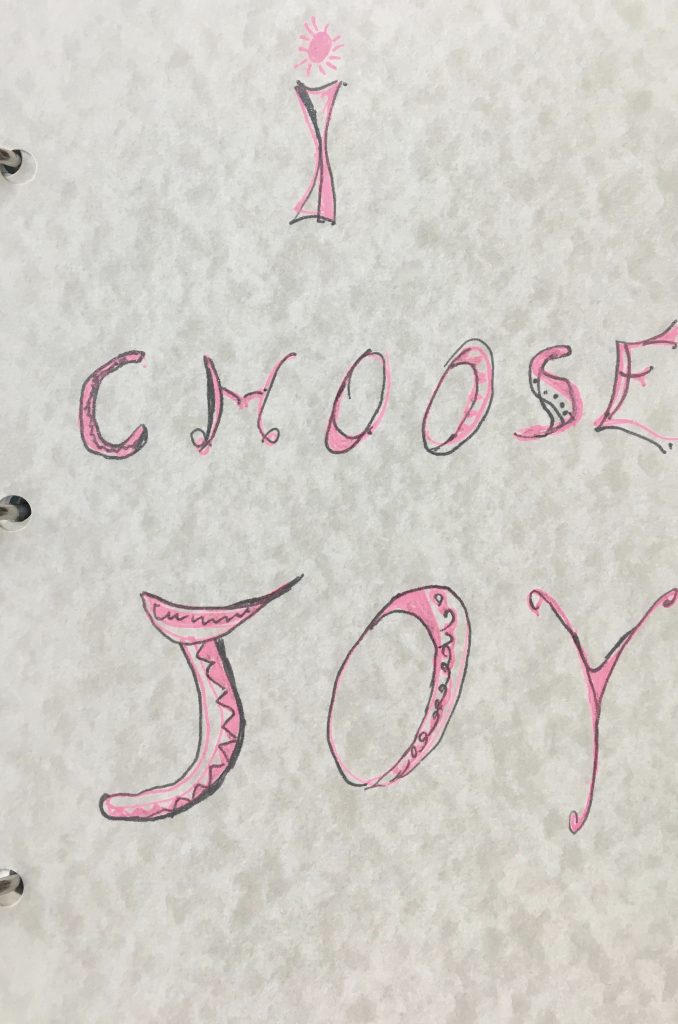 Get out a piece of paper or choose a fresh page in your journal. Write the words I choose joy on the page. Spend a few minutes prayerfully considering this phrase.
Get out a piece of paper or choose a fresh page in your journal. Write the words I choose joy on the page. Spend a few minutes prayerfully considering this phrase.
Now turn to a fresh page and draw a circle. Write inside the circle all the responsibilities and activities that you expect will consume your time in the coming weeks.
- What in your circle gives you joy? – Highlight these responsibilities with a brightly coloured marker or crayon.
- What are you choosing that gives God joy? – Highlight these with another coloured marker.
Now prayerfully look at your list and consider how you could reshape your time over the coming weeks to increase your joy. Think about The Book of Joy, and consider how you could reframe your situation more positively, experience joy and be kind and generous.
- What do you need to do more of to increase your joy?
- What do you need to let go of in order to increase your joy?
- How could you reshape your journey towards
By Lilly Lewin
Advent is a great time to put rhythm into your life, and Celtic Advent starts next week! November 16th. I like starting Advent early because it allows me time to prepare Him Room! Advent allows me time to prepare my heart for the arrival of Jesus! The Celtic Christians, and Orthodox Christians allow 40 days to prepare for the Nativity, just like Lent is 40 days of preparation before Easter. What kind of rhythm do you need in your life as the holidays begin?
Rhythm is a part of God’s creation…a part of how God designed the universe.
Day and night
Sun and moon
Changing of the seasons
All of these help us remember and help us have time and space in our daily routine to rest, reflect, listen, remember, rejoice and worship the Creator.
Sadly our culture in the West, especially America has forgotten rhythm. And sadly, we’ve corrupted the rest of the world with our 24-7 mentality.
We expect to be able to shop, eat out, see movies whenever we want.
We don’t expect to rest ….so we don’t.
We have been schooled that a full calendar means you are successful. And REST is not valued.
And especially during the holidays we want to have our calendars filled with parties and events so no one gets bored.
What if that’s not the best way according to the Creator?
What if God had something better in mind from the first days of the world?
God set up the rhythm of the world…six days creating and one day resting.
Who says we are bigger and know better than God?
What would happen if we made REST and RHYTHM parts of our Advent practice this year? What would that even look like? What would you need to add in or subtract from your calendar in order to find rhythm before Christmas this year?
How could you practice slowing down and finding rhythm rather than living into the crazy busyness of the season? How would you practice REST in the midst of the holidays?
Some ideas to try:
TAKE A WALK Something as simple as TAKING A WALK could add rhythm and rest to your day. And a walk can be done with your dog, your spouse, your roommate, a friend and or with your kids. And not just taking a walk for exercise, but taking a walk to connect with God. Taking a walk to be with Jesus outside, in Creation. Take a walk and take time to notice what is going on in nature. Notice the plants, the sky, the birds, and even the bugs along the way! Take time to BREATHE!
TAKE A NAP Actually TAKE A NAP. I saw a plaque at a craft show that said “Jesus took Naps, I want to be like Jesus!” (Mark 4:38) What if we actually allowed ourselves the time to take a nap. When my kids were little I would try to get as much done as possible while they slept. Now I think the healthier thing to do might be to take a nap too! Or even just give yourself permission to lie down on the couch or your bed for 15 minutes with no agenda! Just to be. I believe REST is holy so taking 15 minutes would be taking holy time! Taking a nap like Jesus even in the middle of the holiday storm!
TAKE TIME TO LIGHT A CANDLE. Many of us create or use Advent Wreaths during Advent. The traditional Advent Wreath consists of a circle of evergreen greenery representing eternal life and eternity and 4 candles to be lit one at a time, adding a candle each week as the weeks go on. On Christmas, a white center candle is often added as the Christ candle to signify Jesus’s birth. There are various meanings for the candles. I grew up with the candles meaning Prophet, Bethlehem, Shepherd, and Angel, but some traditions have the candles represent Hope, Peace, Joy and Love. Some church traditions use three purple candles (purple is the liturgical color for Advent signifying royalty) and one pink (week 3 for Joy), but I tend to use four dark red candles just because I like that better than purple and pink! I have also used all white candles too. I also saw a fun centerpiece at Target that I might use this year for something different, candles in a row rather than in the round.
If you choose to start Advent early, you might create something different for the first two weeks and then go to the more traditional Advent wreath on the first Sunday of Advent, December 3rd in 2017. One year I started with fall colors before traditional Advent began and then took out the brown ones and removed the leaves and left the dark green for my wreath. Last week we created a centerpiece of Thankfulness. We lit the candles for things we are thankful for. I filled a container with sand and then used birthday candles for our prayer candles. We are doing this as a reminder to be grateful as we approach Thanksgiving here in the States.
Even more simply, you might just add a single candle to your day. Light a candle with your coffee cup or your cup of tea as a way to pause and create rhythm in your day. Taking time to consider how you might prepare your heart for Jesus and his birth. Or you might Light a candle when the kids come home from school and take a couple of minutes to thank God for the day. Have the kids take turns lighting the candle or candles and saying what they are thankful for today, or where they felt God’s love during the day. This could be a great practice before homework begins.
How would you like to add rhythm and rest to your life this Advent? I’d love to hear what you discover as you walk, nap, and light candles in the weeks to come!
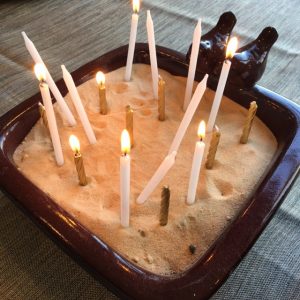
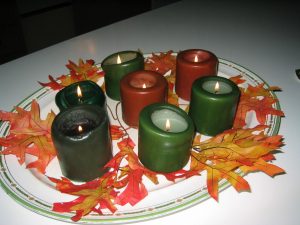
During the month of November and December, we will be focusing on the theme: Joy to the World. Check out this practical post by Hilary Horn —
“A joyful heart is good medicine, but a crushed spirit dries up the bones.” Proverbs 17:22
How true is this proverb? One of our mottos in our family is to “choose joy”. Joy in hardships, depression or trials can seem lofty. Yet when we taste it or are givers of joy, healing happens. It’s medicine to the soul. Below are 5 easy ways in beginning to integrate joy in you community and home.
- When you have a nice thought about someone or are reminded of how lovely they are, immediately let them know. Send them a quick text, message or note. If they are sitting in front of you, let them know. Don’t be shy with nice words. Send them love before it leaves you mind. This isn’t taxing or time consuming, but can brighten up someone’s day, let alone their week!
- Celebrate the little things. Often we tend to celebrate monumental life successes. This is great, but we then forget to celebrate the little moments in life that add up to so much more and spur people on to doing more of those little things. Your toddler finally pooped in the toilet? Go nuts. Your co-worker finally got her deadline in ontime? Tell them how great of a job they are doing. Your neighbor planted some beautiful new flowers? Go gaga over how lovely they look. You saw a stranger pick up some trash on the ground? Comment on how nice that was of them to clean up your city. Celebrate those moments like you are your community’s biggest cheerleader.
- Be a fan of the underdog. The earth is jam-packed with these people who may not be in what society deems worthy or praise, but are bursting with potential and are extraordinary human beings too. We all can pick out the loner in our circles. Go after them with as much enthusiasm as you do your best friend.
- If you’re that underdog or feeling lonely; do what you would want others to do to you. If you are desiring a new friend, be bold and be that friend! Reach out to someone and invite them into your life. Put out what exactly you want to draw in and see friendships blossom.
- Be generous. Generous with your time, your monetarily means, your hospitality, your grace and forgiveness. Let us heal the world one person at a time through our generosity towards others.
Let us give good medicine to the souls of our community. When we want to see joy in our world we have to be people that want to give it too. Jen Hatmaker says in her book, of Mess and Moxie, “Go gaga over your own people…Overvalue them, over-love them, over-encourage them”. I love this. When we overvalue the people in our lives; when we do the little things that make us their biggest cheerleader – you will automatically see the joy spots burst forth in your life. Let us be people who invest wholeheartedly in our communities to give little doses of joy each day – medicine for our soul.
The Season of Advent is all about waiting and preparing for the arrival of Jesus. Honestly, we really don’t like waiting, we want everything right now, right? But what about waiting for Jesus? Is that different?
How do you feel about waiting? When you hear that awful word, “wait,” what comes to mind? How does God view waiting? How long are you willing to wait for a friend or a coworker? Or even someone you don’t like? Are you a fast food follower or a slow cooker/crock pot Christian? Do you expect God to answer now, or are you willing to wait? These are just some of the questions you and your community are invited to consider in the prayer stations of the Advent Waiting Sacred Space.
This Sacred Space will help your community connect with God using all their senses. The Advent Waiting Sacred Space Prayer Experience is a downloadable kit that comes with all the signage to print out for each station, a Leader’s Guide with supply lists and how to’s and photos of each station as a guide for creating your own! The Kit includes 14 Prayer Stations in all!
The Advent Waiting Sacred Space prayer experience is flexible and can be used in different ways based on your community’s needs. It can be set up for a weekend at your church, used on a retreat, or set up for an entire week hosted by you in the evenings, so your community can experience it and bring friends who might never come on a Sunday morning. Or rather than using all the prayer stations at one time, you can do one or two stations each week to go along with your teaching/sermon during Advent. You choose the format that works best for you.
Help your community step away from the craziness of Christmas, and slow down to prepare their hearts for Jesus! Download the Advent Waiting Sacred Space Kit from Freerange Worship!
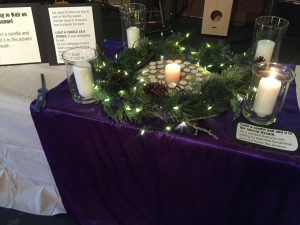
As an Amazon Associate, I receive a small amount for purchases made through appropriate links.
Thank you for supporting Godspace in this way.
When referencing or quoting Godspace Light, please be sure to include the Author (Christine Sine unless otherwise noted), the Title of the article or resource, the Source link where appropriate, and ©Godspacelight.com. Thank you!

